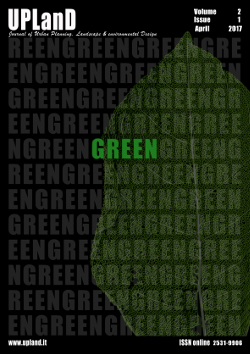Planning Support Systems: from universal solutions to local planning method. The case of planning practitioners in Andalusia.
Main Article Content
Abstract
Processes of urban transformation and technological advances are leading to drastic changes in urban environments and to novel local challenges for urban planners. Scientific research is exploring the potential of various technologies to support planning and Planning Support Systems (PSS) have been proposed as strategies to improve current planning practices. PSS are not without their critics, both from academia and practice, who dispute their usefulness and usability, and they have so far been scarcely implemented in practice, with limited success. Using a case study approach, we report on the findings of in-depth interviews with practitioners in Andalusia, Spain, focusing on the main planning challenges that respondents identify in their work and how technology can help address them. We identified three main challenges: developing an adaptable general plan, improving current public participation processes and encouraging interdisciplinary dialogue. Each planning challenge is understood to have different technological needs (if any at all), that indicates a strong relationship between reported planning challenges, the use of technologies and the planning context. This shows the need to reevaluate mainstream approaches to PSS, shifting from the development of generalized, transferable PSS to context-based approaches that focus on methodologies for collecting situated knowledge on local planning challenges, which could lead to specially-tailored PSS.
Downloads
Download data is not yet available.
Article Details
How to Cite
Luque-MartínI., BildE., Izquierdo-CuberoJ., ValverdeA., & GutiérrezV. (2017). Planning Support Systems: from universal solutions to local planning method. The case of planning practitioners in Andalusia. UPLanD - Journal of Urban Planning, Landscape & Environmental Design, 2(1), 39-47. https://doi.org/10.6093/2531-9906/5138
Issue
Section
Articles

This work is licensed under a Creative Commons Attribution-NonCommercial-NoDerivatives 4.0 International License.
Authors who publish with this journal agree to the following terms:- Authors retain copyright and grant the journal right of first publication with the work simultaneously licensed under a Creative Commons Attribution License that allows others to share the work with an acknowledgement of the work's authorship and initial publication in this journal.
- Authors are able to enter into separate, additional contractual arrangements for the non-exclusive distribution of the journal's published version of the work (e.g., post it to an institutional repository or publish it in a book), with an acknowledgement of its initial publication in this journal.
- Authors are permitted and encouraged to post their work online (e.g., in institutional repositories or on their website) prior to and during the submission process, as it can lead to productive exchanges, as well as earlier and greater citation of published work (See The Effect of Open Access).
References
Batty, M. (1995). Planning support systems and the new logic of computation. Regional development dialogue, 16, 1-17.
Ferrer, A., & de Solá-Morales, M. (2005). El urbanismo municipal en España. Papers. Regió metropolitana de Barcelona, 43.
Geertman, S. (2002). Participatory planning and GIS: a PSS to bridge the gap. Environment and Planning B: Planning and Design, 29(1), 21-35.
Geertman, S., Toppen, F., & Stillwell, J. (2013). Planning support systems for sustainable urban development. Heidelberg: Springer.
Harris, B. (1989). Beyond geographic information systems. Journal of the American Planning Association, 55(1), 85-90.
Healey, P. (1992). Planning through debate: the communicative turn in planning theory. Town planning review, 63(2), 143.
Innes, J. E. (1998). Information in communicative planning. Journal of the American Planning Association, 64(1), 52-63.
Klosterman, R. E. (1997). Planning support systems: a new perspective on computer-aided planning. Journal of Planning education and research, 17(1), 45-54.
Pelzer, P. (2015). Usefulness of Planning Support Systems: Conceptual perspectives and practitioners' experiences (Doctoral dissertation, InPlanning).
Portugali, J. (2011). Complexity, cognition and the city. Springer Science & Business Media.
te Brömmelstroet, M. (2012). Transparency, flexibility, simplicity: From buzzwords to strategies for real PSS improvement. Computers, Environment and Urban Systems, 36(1), 96-104.
te Brömmelstroet, M. (2013). Performance of planning support systems: what is it, and how do we report on it?. Computers, Environment and Urban Systems, 41, 299-308.
te Brömmelstroet, M. (2016). PSS are more user-friendly, but are they also increasingly useful?. Transportation Research Part A: Policy and Practice.
Vonk, G., Geertman, S., & Schot, P. (2005). Bottlenecks blocking widespread usage of planning support systems. Environment and planning A, 37(5), 909-924.
Ferrer, A., & de Solá-Morales, M. (2005). El urbanismo municipal en España. Papers. Regió metropolitana de Barcelona, 43.
Geertman, S. (2002). Participatory planning and GIS: a PSS to bridge the gap. Environment and Planning B: Planning and Design, 29(1), 21-35.
Geertman, S., Toppen, F., & Stillwell, J. (2013). Planning support systems for sustainable urban development. Heidelberg: Springer.
Harris, B. (1989). Beyond geographic information systems. Journal of the American Planning Association, 55(1), 85-90.
Healey, P. (1992). Planning through debate: the communicative turn in planning theory. Town planning review, 63(2), 143.
Innes, J. E. (1998). Information in communicative planning. Journal of the American Planning Association, 64(1), 52-63.
Klosterman, R. E. (1997). Planning support systems: a new perspective on computer-aided planning. Journal of Planning education and research, 17(1), 45-54.
Pelzer, P. (2015). Usefulness of Planning Support Systems: Conceptual perspectives and practitioners' experiences (Doctoral dissertation, InPlanning).
Portugali, J. (2011). Complexity, cognition and the city. Springer Science & Business Media.
te Brömmelstroet, M. (2012). Transparency, flexibility, simplicity: From buzzwords to strategies for real PSS improvement. Computers, Environment and Urban Systems, 36(1), 96-104.
te Brömmelstroet, M. (2013). Performance of planning support systems: what is it, and how do we report on it?. Computers, Environment and Urban Systems, 41, 299-308.
te Brömmelstroet, M. (2016). PSS are more user-friendly, but are they also increasingly useful?. Transportation Research Part A: Policy and Practice.
Vonk, G., Geertman, S., & Schot, P. (2005). Bottlenecks blocking widespread usage of planning support systems. Environment and planning A, 37(5), 909-924.

